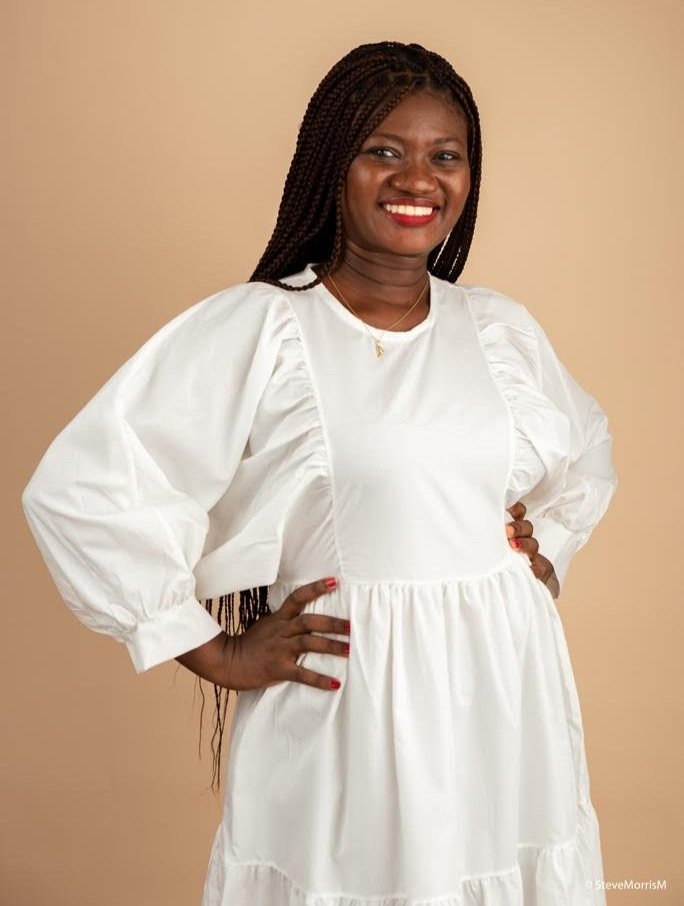Transcendence. A Short Story
By Akua Serwaa Amankwah
1st Place Winning Entry of the imagining Early Accra competition (Adult Category)
About: Transcendence is a short story chronicling a surreal moment experienced by Effia, a professor who returns to Ghana to sell the childhood home in Ridge that is her last tie to her family. When she opens the front door of her childhood home, she travels back in time right into her life as a girl in the early 1950s in Accra. Using archival and historical sources such as photographs, videos and books in combination with music from the era, Akua Serwaa Amankwah takes us on a journey through Ghanaian history from the imagined experiences of an Accra family. She weaves together an imagined story that takes us through moments such as the much talked about wedding of Joe Appiah and Peggy Cripps, the first independence celebrations, and post-independence political agitation in Ghana.
“Transcendence” is also available as an audio narration produced by Kwame Asante Ofori.
She only meant to make a brief stop at her childhood home in Ridge, relive and purge memories, and give the nod to Broll. They had reached out after Mama’s death, and their argument was plausible—most of the houses in her childhood neighbourhood had been transformed into luxury apartments, and their empty colonial home stuck out like a sore thumb. They knew she had no intention of settling there, and made an overgenerous offer which led her on the next flight to Ghana.
There were several downsides already; the internet was a special kind from hell, and her favourite food brands were unavailable. She was eager to return to lecturing, academic conferences, editing monographs, mentoring her favourite PhD student Naminata, bi-weekly intellectual conversations with Akua Busby, Ato Quayson, and Kwame Anthony. The other thing she dreaded was responding to her daughter’s lengthy message about making time for her grandchildren. You had kids, and they had kids and somehow you had to relive the motherhood experience all over again? Wasn’t once enough?
But then, she opened the glass front door to find her childhood staring at her: her mother rushing to make it in time for a Drum Magazine photoshoot, her father religiously poring over every word in the African Morning Post, her brother Kobena dismantling an old radio.
“Effia? Have you seen my diamond earrings?” Mama asked, frantic, her angelic face etched into a frown. This was the first photograph that greeted you at the entrance, a spontaneous shot of their family. It was a Saturday afternoon in 1950, and she had just turned eight.
“Effia? Say something eh? Ah,” Mama shook her head, and returned to her search.
Papa looked up. “Where have you been? Teteba was looking for you, said your breakfast is getting cold.”
“Ou-outside,” Effia stuttered. Her love for exploring knew no time limits.
“It’s too early to be outside.”
“Yes, Papa.”
She sat by him. It was an unspoken morning ritual. Over his piping hot morning tea, he told her about the arcane art of Gold Coast politics. She didn’t always get the intricate details of the conversation, but his passion was infectious. Things got even more heated when Uncle Joe, Papa’s favourite cousin who was studying law in England, visited. He helped Papa secure an enviable managerial position at United Africa Company (U.A.C).
“You know today’s exactly two years since the riots happened? I still get angry when I remember all that madness,” he said, taking a sip from the tea whose vapour swirled up in a blurry dance.
They segued to a confidential letter Uncle Joe had sent—he was all over the place in England, joining protest movements, attending political conferences, supporting freedom fighters. Effia secretly marvelled at all that confidence. Even Papa was awed by him.
Mama, the chocolate whirlwind and a very welcome distraction returned. Papa had nicknamed her ‘Somebody’s Darling’, and she loved it. She was glowing, her voluminous natural hair teased into a bouffant, eye liner ending in an upward flick, ears glittering with diamond studs. Her navy velvet dress accentuated her curves, and she struck a pose, tucking her cat-eye sunglasses between her breasts. She smelled of Yardley lavender talc and good dreams.
“I will be back as soon as I can. James will have a fit if I don’t get there any time soon,” she said, but then she paused to make a quick call with the telephone before rushing out.
“It’s like living with a showgirl,” Papa muttered under his breath, but only Effia heard it.
She disappeared to the kitchen to find Teteba, and later when she came back, Papa was buried in work.
The next was Papa’s favourite, a framed black and white photograph of himself and Mama at Uncle Joe and Lady Peggy Cripps’ wedding. Effia had had to stay home, but she closely followed the ceremony at St. John’s Church on television, marvelling at the resplendence which unfolded. She was enthralled with the groomsmen shining in kente, their afro hair carefully combed and parted at the side. There were the agbadas, smocks, sarees, waistcoats, and frilly frocks. And in the midst of it all, a smiling Uncle Joe and his equally excited bride. In the newspapers, the backlash at Uncle Joe, the “coloured” man who had dared marry a white woman was troubling, but she knew he would be unfazed. Mama gave vivid details, and Papa was full of updates about Kwame Nkrumah, the Convention People’s Party (C.P.P.), and Uncle Joe’s plans of returning to Gold Coast after his Paris honeymoon. She knew her father would soon transition to politics.
She also sensed his budding indifference about Mama. In the beginning he complained incessantly about her constant absence, but politics began to fill his free time. Mama took advantage, attending soirees, weekend parties at Jamestown, exclusive parties at the Rodger Club, and occasional movie nights at Rex Cinema. Her companion in outings Auntie Frema, the wife of Papa’s racehorse owner friend Kwame Awuah, brought her little gifts. Effia would experience the dance through photographs that emerged after—men in kaleidoscopic kente, others in formal suits, Fuji silk shirts and meticulously tailored trousers, women in swing and shirtwaist dresses, floral and polka dot silks, and African textiles transformed into magical pieces.
The next photograph was Mama’s favourite, the day that Uncle Joe returned. Papa was at the airport with James, and what serendipity that not just Nkrumah was there, but also Papa’s idols Edusei, Botsio, and Gbedemah to welcome Joe. Barely a month later, Papa sent in his resignation at U.A.C. and followed Uncle Joe to C.P.P. Countless issues with Nkrumah would later lead them to sever ties with him and join the National Liberation Movement, and this marked the beginning of a tortuous political journey for them and their families.
When she thought of home, she remembered the photographs that framed the wall, most of which were born out of their Sunday rituals. After lunch, Mama would cajole them into dressing up, and they would move straight to Jamestown, to either James’ Ever Young Studio for photographs, Felicia Abban’s studio, or Deo Gratias. Home was teeming with photographs in voluminous albums, storage boxes, trunks. They were not the only ones capturing each stage of their lives; the air was charged with excitement with the anticipation of independence, and photography, with a side of highlife music, was all the rage.
When Kobena left his gadgets alone, they would explore their two-storey mansion house which was elevated about fifteen feet above the ground on stilts. Papa had bought it from Sir. Allan Scott, the younger brother of a past colonial governor, and said the elevation was to improve aeration and prevent mosquitoes which used to plague them. She loved its poshness, from the glass windows to the white chiffon curtains.
A blue-grey Dansette record player was the showpiece of the lounge, and then there were the camel Mid-Century modern sofas designed for aesthetics rather than for comfort, a wall adorned with the best selections of framed photographs, a sideboard filled with china, books, and records from E.T. Mensah’s Tempos band, Appiah Adzekum, Kwame Asare to Kwaa Mensah. The kitchen boasted of the latest appliances shipped in through U.A.C., and to go the bedrooms upstairs, you had to use a grand, winding staircase. On some evenings, Somebody’s Darling would gather them to listen to records while sipping imported juice. Sometimes, she danced.
Those were years she should have savoured, because with Papa in politics, and his subsequent opposition to the ruling party came challenges. Then came changes, Mama’s transition from modelling and partying to taking the reigns of her family cocoa business after her parents passed in an accident, Kobena’s tinkering leading to engineering, and subsequently a scholarship to Cambridge. Her parents supported each other for the first time. Teteba taught her to be independent and strong, traits which became necessary for all the hard times that followed: Papa imprisoned with Uncle Joe under the Preventive Detention Act, and Mama’s company seized at the height of the coup in the late 1970s.
They fled to California, and Effia made friends involved with the Civil Rights Movement who inspired her to become a miniature Uncle Joe. She started a postgraduate degree, leaving only Mama to return to Ghana. She exchanged letters with Papa till his release two years after his imprisonment. She visited sparingly, but each moment at home was precious. Papa died first, and a decade after his darling followed.
Now here she was, all those heavy years compressed into memories which lay in a house she was about to sell off.
Her ringing phone startled her, for she had lost her sense of time and place.
“Prof. Asafu-Adjaye? This is Barima from Broll Ghana. I was following up on our conversation regarding the sale of your house.”
She fumbled to string the right words together.
“Yes. I meant to call. I’m sorry-I-I…ju-I can’t sell this house. I’m so sorry.”
About the Author: Akua Serwaa Amankwah is an academic, author, and creative entrepreneur. Her research interests revolve around (Digital) African Literature, Photography, and Photography Criticism. Her stories have been published in The Mirror and Flash Fiction Ghana, as well as Kenkey for Ewes and Resilience Anthologies. She won the Inspire Us Writing Contest by Worldreader in 2019, and the imagining Early Accra competition in 2021. Akua is the creative lead of the company Create with Mansa, which creates reading and writing resources for children aged 2-12. She anticipates an MPhil degree in English (Literature) from the University of Ghana, Legon, in 2022.



